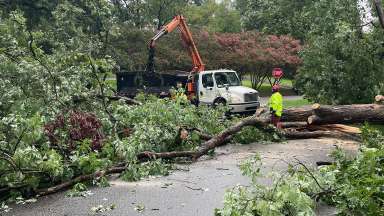“The next time a hurricane comes through, Raleigh could be the area that gets devastated. The people we are helping today, they wouldn’t hesitate to come help us.”
This is what Division Fire Chief Patrick Marks said last fall when the Raleigh Fire Department helped western North Carolina after Hurricane Helene. Helene was the deadliest mainland hurricane in the United States since Katrina in 2005.
The official Atlantic hurricane season is coming up again – it runs from June 1 to Nov. 30. Learn how you can prepare for it!
Power of Hurricanes
Hurricanes are among nature’s most powerful and destructive phenomena, according to the U.S. National Oceanic and Atmospheric Administration. On average, 14 storms form over the Atlantic Ocean, Caribbean Sea, or Gulf of Mexico during the season.
Hurricane Preparedness Week
NOAA encourages communities to prepare for hurricane season. It sponsors National Hurricane Preparedness Week during the first full week of May. Each day of the week focuses on a different theme, including knowing your main risks (water and wind) and understanding forecast information.
NOAA and first responders emphasize that you can increase your chances of survival by knowing what actions to take before, during, and after a hurricane.
Before
For months, weeks, and days before a hurricane, make sure you have the right supplies and have taken the correct precautions.
- Build an emergency kit: drinking water, batteries, flashlights, food for three days, medications, and first aid kit (remember your pets, too).
- Keep your phone charged, car fueled and have extra cash on hand.
- Sign up for local alerts and warnings to receive timely information about hurricane watches and warnings. Follow trusted sources for updates.
- Bring in outdoor furniture, decorations, garbage cans and anything else that’s not tied down.
- Ensure a supply of water for sanitary purposes such as cleaning and flushing toilets. Fill the bathtub and other larger containers with water.
- Prepare to cover windows and doors with shutters or other shielding materials. Reinforce your garage doors.
- Turn off utilities and propane tanks.
During
If a hurricane watch or warning has been issued, there are several actions you should take.
- If told to evacuate, do so immediately.
- If sheltering during high winds, go to a FEMA safe room, storm shelter, or a small, interior, windowless room or hallway on the lowest floor that is not subject to flooding.
- If trapped in a building by flooding, go to the highest level of the building. Do not climb into a closed attic. You may become trapped by rising flood water.
- Listen for current emergency information and instructions.
Use a generator or other gasoline-powered machinery outdoors ONLY and away from windows. - Do not walk, swim, or drive through flood waters. Turn around, don’t drown! Just six inches of fast-moving water can knock you down and one foot of moving water can sweep your vehicle away. Heed Flood Warning Signs posted in flood-prone areas.
After
- Check on friends and neighbors.
- Listen to authorities for information and special instructions.
- Be careful during clean-up. Wear protective clothing and work with someone else.
- Don’t touch electrical equipment if it is wet or if you are standing in water. If it is safe to do so, turn off electricity at the main breaker or fuse box to prevent electric shock.
- Avoid wading in flood water, which can contain dangerous debris. Underground or downed power lines can also charge the water.
- Save phone calls for emergencies. Phone systems are often down or busy after a disaster. Use text messages or social media to communicate with family and friends.
- Document any property damage with photographs. Contact your insurance company for help.
- Watch for fallen power lines and trees. Do not go near a fallen power line (assume it’s live)! Report them to Duke Energy at 800-452-2777.
- Report trees that have fallen on streets and sidewalks to the City by calling 919-829-1911.
